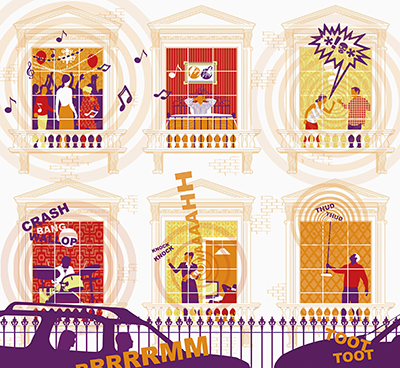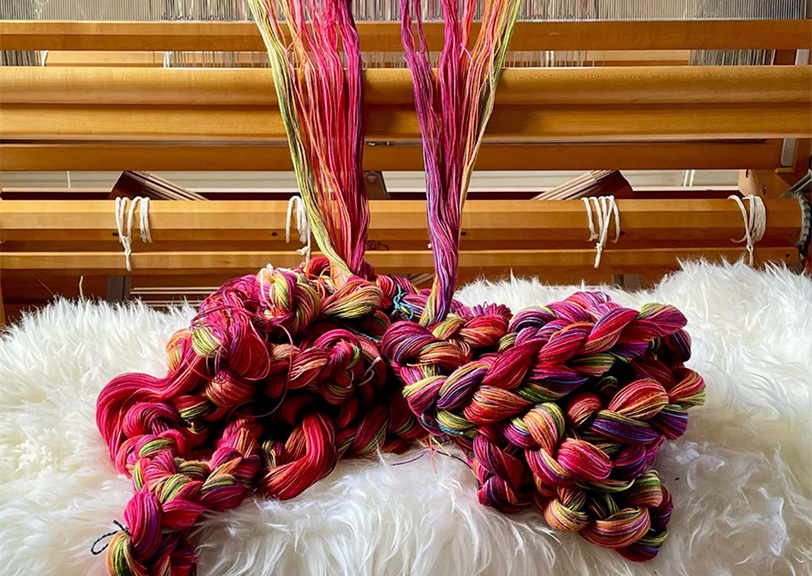ENTER YOUR EMAIL TO RECEIVE OUR WEEKLY NEWSLETTER
How to Soundproof Your Apartment
Companies that soundproof windows, floors, and walls are in high demand.
By Georgetta Lordi Morque

UPDATED FEB. 10, 2022
According to the Associated Press, New York City apartment dwellers cite noise as the No. 1 quality of life complaint. Whether it’s barking dogs, energized children, deafening music, loud neighbors, apartment renovations, honking horns or garbage trucks, indoor and outdoor noise can be unbearable. If the noise is caused by neighbors, you can politely notify them, complain to your super or your board and, if tenants won’t cooperate, threaten to withhold your rent. If the noise is caused by raucous outdoor parties or stuck auto horns, you can call the city’s 311 hotline, hoping the police will come by. But since often these measures won’t work or aren’t applicable, many New Yorkers are taking noise matters into their own hands and soundproofing their windows, floors, walls, and ceilings.
Soundproofing Windows
Ear plugs and white noise machines can only do so much if you live near a construction project or face a street jammed with traffic and early morning garbage trucks. Covering your windows with heavy-duty drapes is the easiest and least expensive option to reduce outdoor noise. Beckenstein Fabrics and Interiors recommends floor-to-ceiling layered curtains composed of velvet on each side with a felt interlining and a “Black-out” lining between the two layers.
Soundproofing your actual windows is more expensive—ranging from $750 to $1,000 per window, but soundproofing is also more effective. Michael Damelin, owner of Cityproof, says there’s been a definite increase in business in recent years due to all sorts of building and rebuilding. Cityproof is the city’s oldest soundproofing company. It has been custom-designing, manufacturing and installing soundproof windows since 1960. The company works with apartment owners as well as tenants and landlords of rental buildings and can soundproof windows in finished or unfinished apartments. It can also soundproof terrace doors and build enclosures around noisy air conditioners.
“I purposely bought my apartment twenty years ago because it faced a tree-lined courtyard in the back and was quieter than my downtown studio, where I woke up every morning to the sounds of trucks rumbling over metal plates in the street,” says Irene Nathan, a writer who works at home. “But after ten years of serene living, we heard the dire news: A hospital was scheduled for construction close to our windows. I knew I couldn’t tolerate the noise and I didn’t want to move. I learned about Cityproof from a neighbor and called the company immediately. They soundproofed all my windows and the difference was remarkable: I never hear sirens from the street or blaring music from parties in the courtyard—and I wasn’t even bothered by the hospital construction!”
CitiQuiet is another high quality soundproofing company. It was founded in 1992 by Michael Lentin, then a custom-window installer, when he tried to find a way to improve the sleepless nights of a friend who was caring for a newborn in a noisy bedroom. Rich Galietti, VP and managing partner, says that all technicians are trained with CitQuiet products; the company offers a 30-day money-back guarantee and a free consultation by a representative who will bring samples to your home and show you how the windows will work.
Cityproof and CitiQuiet do not replace existing windows; instead they install interior windows that cover existing windows. This creates a buffer zone of airspace that blocks up to 95 percent of city noise. Custom-designed for windows of all styles and sizes, the windows are made with glass of varying thickness depending upon an individual’s needs and noise sensitivity. A one-half-inch glass, which provides 80 to 85 percent of noise reduction, is the most popular selection for Cityproof customers.
As an added bonus, interior windows keep dust and dirt at bay and block the sun’s harmful UVA rays. Plus they are energy efficient since they keep the cool air inside and the hot air outside, thus cutting the costs of heating and air conditioning. And those people who like fresh air will be happy to know that both the original window and the interior window can open—if you remember to regularly spray the metal frame that holds the window with lubricants like Paraffin 100% Silicone Spray. Otherwise it can be difficult to slide the interior window and open the outside window.
The downside is that interior windows are pricey. Some people start with the master bedroom, says Cityproof’s Damelin. Then they may add other rooms at a later date, particularly if the windows face the street; other tenants do the whole apartment at once. Count on around seven to eight weeks from the first consultation to the final installation. But the actual installation only takes about an hour and a half to two hours per window. Since every need is different and all windows are customized, costs do vary.
Cityproof estimates that to provide and install interior windows for two windows, each 32 inches wide and 54 inches tall, the cost to soundproof both would be $1,480 for 60/65 percent noise reduction, $1,860 for 70/75 percent noise reduction and $2,160 for 80/85 percent noise reduction. Other factors may impact the final pricing, such as moving or relocating any window treatments, providing air conditioner enclosures for either through-the-window or through-the-wall air conditioners, or any special work required to provide a proper mounting area for the window. Cityquiet prices are essentially competitive, but it’s best to call either Cityproof or Citiquiet—or both—to obtain an accurate estimate for your needs and decide which company is better for you.
Soundproofing Walls and Ceilings
There are more options for soundproofing a wall or ceiling to block out hammering and drilling from upstairs neighbors, loud music from stereos or noise from TV’s, not to mention tapping and heavy walking from upstairs neighbors who practice their cha-cha on uncarpeted floors or children who use their apartment as a basketball court. Your first step is to send a polite but firm note to your upstairs neighbors and cc: your co-op board, asking owners to cover their floors with heavy-duty carpeting. (In some co-ops, its mandatory for tenants to cover 70 percent of their floors with carpeting if tenants below are constantly disturbed.) According to the Carpet and Rug Institute, cut-pile carpets rather than loop pile are better choices for sound absorption. Foam-backed carpeting is also effective.
If thick carpeting and matting won’t do the trick for floors, the best remedy may be soundproofing, which is more complicated than soundproofing windows. Ronan Blee, owner and founder of Quiet Zone Soundproofing NYC, has been soundproofing apartments for 16 years and he works with architects, landlords, designers, real estate managers and apartment owners to soundproof offices, walls, floors, doors and ceilings. “Soundproofing has taken off in a big way in the city,” he notes. Soundproofing floors involves removing the existing flooring and adding sound control “underlayment” that is made from recycled rubber; then laying down a plywood floor and a finished floor on top. Depending upon the size of the apartment, this can take a couple of days, and costs run around $35 per square foot. A 12′ x 20′ room could cost around $8,000.
But if the problem is noise from neighbors who won’t co-operate—or thin walls that carry even minimal noise—you might need to insulate your walls. Blee says that 70 percent of his work involves soundproofing walls, particularly bedroom walls since they often carry noise from neighbors’ TV’s, loud conversations and even private activities. Most often it’s new apartment owners who are soundproofing their habitats before they move in.
Blee customizes every job, but says you can expect to pay a minimum of $5,000 for an average-sized wall. The process involves removing the existing sheet rock to expose the frame, adding insulation, sound isolation clips, framing and, finally, amassing a loaded vinyl soundproofing barrier to produce a soundproof drywall. This can take a week or more, depending upon the extent of the project.
Soundproofing your ceiling is similar to soundproofing walls, but much more work, says Blee, since the project involves the entire room. Soundproofing a door to block out hallway noise involves sealing up the airspace where the door meets the frame and the floor. An automatic door bottom is then attached to the door itself to seal the space where the door meets the floor.
If you’re willing to hire an independent contractor or carpenter to do the job, another and possibly less expensive option is to contact SoundProof Cow a 15-year-old company that sells soundproofing materials.
While New York is the city that never sleeps, residents do need their shut-eye. And this may wind up costing money. Of course, if that isn’t appealing, there’s always an alternative: Sell your apartment and move to the country!
Georgetta Lordi Morque is an award-winning freelance writer and public relations consultant who focuses on sports, fitness and health.











